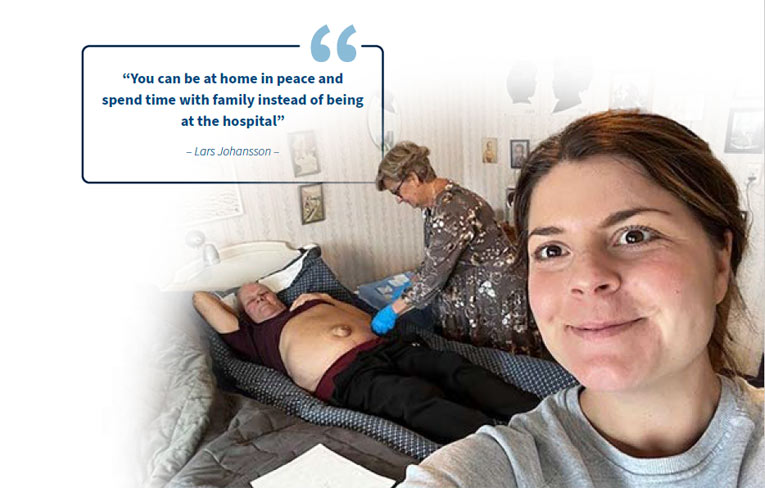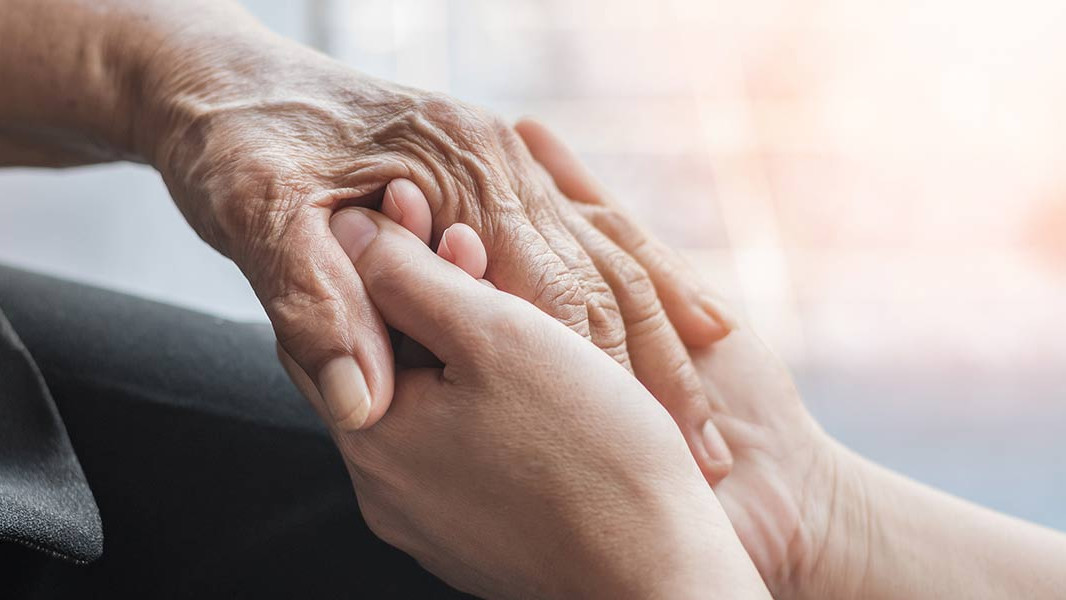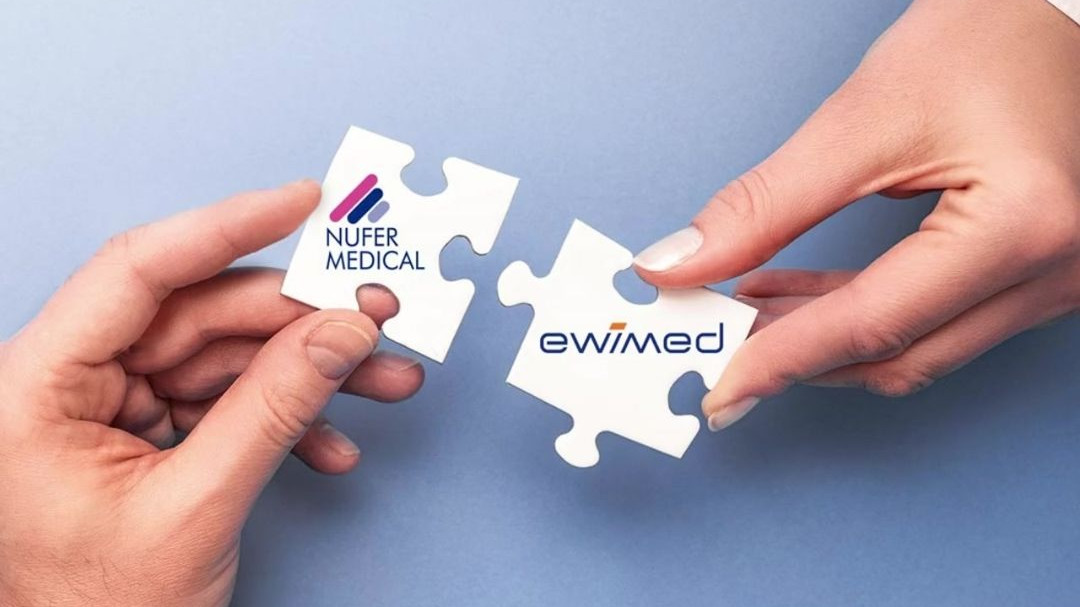Quality of Life - A Patient's Story
7 May 2024

Lars Johansson had a PeritX catheter implanted in May 2023. He and his wife Anita have been conducting the drainage at home, and he wants to share his experience to help other patients with recurrent ascites understand the benefits of improving their quality of life.
Lars lives with his wife Anita in a small community in the south of Sweden. Lars is 76 years old, and Anita is 69. They met on the dance floor in 1970 and have been married for 50 years in January 2024. They both have an active life with a big family – 3 children, 8 grandchildren and 5 step-grandchildren – and lots of hobbies. Lars loves football and was active as a football coach for kids. They have a caravan and traveling the country with it was a very important part of their life.
Life before PeritX
Until the fall of 2020 Lars was an active man but then his belly swelled up over time. One day when they cleaned their caravan in the driveway, his condition worsened so they had to visit the emergency department. Many tests later, he was diagnosed with liver cirrhosis due to alcohol. He started his journey to quit drinking and was put on diuretics. Lars also has some comorbidities like heart failure, which do not make his situation easier.
After this day his life changed. Between 2020-2023, Lars needed to drain ascites every 4 to 5 weeks. This meant going to the hospital and conducting the, as he said, painful paracentesis procedure. This took a couple of hours before going home the same day. By early 2023, he had to be booked at the hospital every 2 weeks to drain 8 liters at a time. Everyday life before each procedure was very hard. Lars found it difficult to breathe and had no mobility or energy. He lost his appetite and could not put his trousers on because of the swelling. “It was most difficult in the days before the draining” he says, “and a big relief to get it done despite the painful procedure.” He found the subcutaneous injection of anesthesia prior to the paracentesis to be the most painful part.
Anita described this time as very hard, where they also had to call an ambulance a couple of times.
Discovering the solution
The first time a physician mentioned the option of having a PeritX implanted was at a paracentesis procedure in February 2023. The gastroenterologist (Li Olofsson) observed how the repeated procedures effected Lars, and the negative impact the worsening symptoms had on Lars and Anita’s lives. It sounded like a good solution, but they still had many uncertainties. Lars was afraid it would be too hard for Anita to handle, and there was a fear of losing the close and secure connection with the hospital. They found the ewimed brochure very good and informative but felt there was a lack of other patients’ experiences with the catheter.
Anita’s requirement was not to involve any home healthcare, they wanted to take care of the drainage themselves. A supporting factor for the decision was their daughter-in-law, who was familiar with the system from working with lung patients. She was positive to the procedure since she had seen the clear benefits for patients.
Implantation and adjustment period
Lars and Anita finally made the decision, and he was scheduled to get the catheter implanted on May 4, 2023. Lars says: “The procedure was nothing strange, it felt safe and by this point you are used to it”. A few days after the implantation, ewimed’s instruction nurse visited them at home for the drainage training and they emptied 2 liters together. The ordination was to drain a maximum of 2000 ml 3 times a week.
There were a few complications. Some leakage from the wound after implantation, which stopped after a week. Itching of the skin under the dressing, which was solved by using a different dressing for sensitive skin. In June a sepsis developed. Antibiotics solved the infection and Lars could keep the catheter. They were thrilled about keeping the catheter since they could now travel to a hunting lodge in their caravan.
As time went on, they continued with their normal life. The amount of ascites decreased and by the end of October his ordination was changed to drainage every 3 days.
When we visited Lars and Anita in December 2023, Anita emptied 1800ml within 10 to 15 minutes and the whole procedure was finished in less than 30 minutes. Lars was on his bed and Anita prepared the bedside table with the ewimed drainage set. They are grateful for the set, having everything they need to keep the routine clean and easy.
Benefits of having the implanted catheter
Lars mentions “The immediate benefits are of course no need for hospital visits, less fluid per drainage, and continuous symptom relief! We now have the flexibility to live in our caravan the whole summer and fall season.” He has also regained his appetite.
“Getting the catheter implanted was a very good decision. After the training at home, drainage has not been difficult. Only changing the dressing is difficult for one person to do,” says Lars with a laugh “but after doing this a few times together with Anita it’s a routine that has allowed me to regain mobility.” They continue to have regular contact with the hospital as well. For Anita, helping Lars has been easy and she finds is comforting to witness his improved well-being. “He is more independent and feels better” she says.
Conclusion
Lars wants to share his story to encourage other patients with recurring ascites or pleural effusion to take the step. ”You should take the decision without a doubt if it suits you! You can be at home in peace and spend time with family instead of being at the hospital” he says. The benefits far outweigh the fears he had, and they would have made the decision earlier if they had heard of other patient stories.
When our Key Account Manager Gana visited the couple for the interview, it was shortly before Christmas and there was an air of holiday anticipation. They planned to visit friends in the evening to play board games. With Lars’ condition under control, Anita could also focus on preparing for Christmas with the family. She was planning to decorate the house and prepare the Christmas baking for the hugely appreciated family gathering. Celebrating Christmas at home with family is very much appreciated and greatly improves their quality of life!


